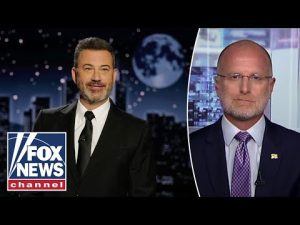In the latest chapter of the saga known as late-night television, our once charming host, Jimmy Kimmel, has found himself sidelined from his own show. Yes, the alleged witty comedian has been temporarily benched by ABC, possibly at the behest of Mickey Mouse himself. The drama unfolded after Kimmel made some truly outlandish comments about Charlie Kirk’s tragic demise, perhaps hoping that sweeping, unfounded allegations would somehow boost his plummeting ratings. Still, Kimmel’s ignorance managed to rattle the industry, leading to a chorus of advertisers threatening to pull the plug if their demands were ignored.
Kimmel’s face of defiance was captured in a flurry of cameras as he stormed out of the ABC studios, determined to hitch a ride away from the brewing storm, as if he were the star of some retro action movie. However, halfway across the world, Trump couldn’t resist weighing in. According to Trump, Kimmel was booted not just for the inflammatory claims about the tragic murder of Charlie Kirk but also because his ratings were as dismal as an off-season theme park. It was less of a critique and more of an eye-roll.
So why did Kimmel’s on-air performance suddenly screech to a halt? His attempt to exploit Charlie Kirk’s tragic death and weave it into a narrative to stir political turmoil was apparently enough to give ABC executives heart palpitations. Passionate threats from advertisers and affiliate stations cracked the facade of Kimmel’s cockiness, pushing Disney’s leadership to demand an apology. Yet, the comedian doubled down on his rhetoric, opting to go for round two despite the visible landmines before him.
While Kimmel believed himself untouchable, the bandwidth of patience from Disney’s brass ran short, not unlike those often-unentertaining monologues. Of course, Kimmel fancying himself bigger than Mickey Mouse, and thus above the consequences of spreading inaccuracies, was a paradox waiting to pop. With mounting threats of boycott and reputational nose dives at stake, “taking a breather” might have seemed like the least they could do to prevent further damage.
As with all tales of high-flying entertainers with low-hitting ratings, Kimmel’s saga isn’t novel. Show business has long been burdened—if not occasionally amused—by loose cannons on their payroll. Yet, the constitutional freedoms to speak don’t necessarily translate to a carte blanche ruling on network airwaves. Even in the glitzy sphere of late-night, there exists a delicate balance between creative expression and maintaining public decorum. Kimmel, through error rather than talent, exposed his political lean with a lack of grace that might have left even Johnny Carson shaking his head.







